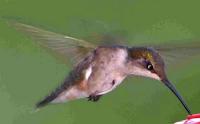
Water Volumes and Batch Sparging
#21

Posted 11 July 2012 - 05:56 PM
#22

Posted 11 July 2012 - 06:10 PM
Now that makes sense....NOT! Don't make my brain hurt please.I feel that we're all being way too helpful to the new guy, so I'm going to complicate things a bit and try to confuse him.My experience is that mash thickness doesn't matter for the saccharifaction rest(s), anywhere in Denny's range of 0.75 to 2.0 qts/lb is OK. The exception is when you're doing an infusion mash with rests at different temperatures. My experience is that the cooler rests for acid and protein are more effective with a thicker mash, more in the 0.5 to 1.0 qts/lb range.
#23

Posted 11 July 2012 - 07:14 PM
That's strange. That would be backwards. 5 gallons to the mash and 3 or so gallons as the sparge would be closer to correct.I have been looking through a couple of recipes on Beer Smith and other programs and have notices that the initial volume of water is around 3.5 or so gallons if the pre boil volume is 6.5 or so. This is usually followed by 4-5 gallons of batch sparge water.
I'd increase the upper limit to at least 3 qt/#. I usually shoot for 2 qt/#, which I understand is just under the thickness favored by German breweries.I've found that as long as the mash thickness is between about .75-2 qt./lb. it really doesn't make a lot of difference.
#24

Posted 12 July 2012 - 02:28 AM
I don't get that at all. I wonder why?That's strange. That would be backwards. 5 gallons to the mash and 3 or so gallons as the sparge would be closer to correct.
#25

Posted 12 July 2012 - 02:43 AM
Part the larger 1st water add will be absorbed by the grain leaving a smaller run off, more equal to to your second water addition.I don't get that at all. I wonder why?
#26

Posted 12 July 2012 - 03:14 AM
#27

Posted 12 July 2012 - 04:43 AM
Forgive my ignorance on this and please indulge me. I don't do second infusions before mash out or getting second rubbings, so are you suggesting that I do my dough in with 5 gallons of water? Then use 3 gallons for batch sparge?Use a little over 3 gallons for your sparge and you have 6.5-7 gallons, pre-boil. I'd only mash in with ~3 gallons if I was planning on adding another 1.5-2 gallons, prior to first runnings, for a step infusion or a mashout.
#28

Posted 12 July 2012 - 05:24 AM
Was this message mean't for the PH??? :huh:Just kidding... :PIf I think about it, my standard 5.5 gallon batch is about 10 pounds of grain. I'd say that my mash infusion is 3 gallons. My sparge water volume is around 5 gallons. I typically collect a total of 7.5 gallons. I don't have issues with losing wort with higher amounts of sugars in it to "dead space" because I fly sparge. As Blktre preaches, you need to monitor the gravity of the runnings towards the end of the fly sparge.Forgive my ignorance on this and please indulge me. I don't do second infusions before mash out or getting second rubbings, so are you suggesting that I do my dough in with 5 gallons of water? Then use 3 gallons for batch sparge?
#29

Posted 12 July 2012 - 05:28 AM
Sorry, iPad autocorrect or fat fingersWas this message mean't for the PH??? :huh:Just kidding...
.
#30

Posted 12 July 2012 - 05:48 AM
I'd err on the side of fat fingers as the "b" button is next to the "n" button. I thought it was funny as I read it, even though I understood what you meant.Sorry, iPad autocorrect or fat fingers
Edited by Deerslyr, 12 July 2012 - 05:48 AM.
#31

Posted 12 July 2012 - 06:36 AM
and as the polar opposite, I use a water meter that reads to the tenth of a gallon ..I don't do any calculations or measuring....Dough in with appropriate water temperature and volume to get you to where the mash loosens up and you are at the temp you want.Run all that off. see where I am volume wise in the kettle.If I need 3 more gallons I take my one gallon pitcher and add three loads of hot to the mash tun, then run it out....bam, desired volume.As mentioned above after you do the initial runoff there is no more grain absorption.Works great for me.
#32

Posted 12 July 2012 - 07:05 AM
#33

Posted 12 July 2012 - 07:09 AM
Makes sense!Batch sparging calculations / process that I use:total grain weight in lb * .4 qt/lb = estimated grain absorbtiontotal grain weight in lb * 1.25 qt/lb = mash strike water volumeboil start volume = your mileage will vary, let's say 7 galfirst running volume = 1/2 boil start volumeAdditional sparge water to add to mash before first running = first running volume - (mash strike volume - grain absorbtion)Additional sparge water to add before second running = 1/2 boil start volume
#34

Posted 12 July 2012 - 07:12 AM
And yet despite all of our differences in our processes, we all make beer. It's a very "forgiving" product to make. You really have to work hard to make truly bad beer. The wide variety of process and procedure that we all bring to the table is truly amazing.and as the polar opposite, I use a water meter that reads to the tenth of a gallon ..
#35

Posted 12 July 2012 - 07:31 AM
I know something was done like it in the early greenboard days, before my time, I remember others mentioning itAnd yet despite all of our differences in our processes, we all make beer. It's a very "forgiving" product to make. You really have to work hard to make truly bad beer. The wide variety of process and procedure that we all bring to the table is truly amazing.
to us all!!!!I know we have "community brew" recipes, but have we ever tried a "community brew recipe competition"? We all brew the same beer and submit to a judge/judges.
#36

Posted 12 July 2012 - 07:35 AM
Problem is that none of our recipes ever fit into a BJCP category.I know we have "community brew" recipes, but have we ever tried a "community brew recipe competition"? We all brew the same beer and submit to a judge/judges.
#37

Posted 12 July 2012 - 07:38 AM
Kinda. The details are fuzzy now but there was a comp in (I think) Charlotte and a lot of us submitted beers to it. Quite a few people showed up in person. Jimvy, Beer Engineer, can't remember who else.I know something was done like it in the early greenboard days, before my time, I remember others mentioning it
#38

Posted 12 July 2012 - 07:46 AM
Couldn't we come up with a recipe that actually fits into a BJCP category? Either that, or just do a recipe and to hell with BJCP standards and just have someone judge it completely subjectively.Problem is that none of our recipes ever fit into a BJCP category.
#39

Posted 12 July 2012 - 08:15 AM
exactly!And yet despite all of our differences in our processes, we all make beer. It's a very "forgiving" product to make. You really have to work hard to make truly bad beer. The wide variety of process and procedure that we all bring to the table is truly amazing.
#40

Posted 12 July 2012 - 09:06 AM
Preach it!!And yet despite all of our differences in our processes, we all make beer. It's a very "forgiving" product to make. You really have to work hard to make truly bad beer. The wide variety of process and procedure that we all bring to the table is truly amazing.
to us all!!!!
1 user(s) are reading this topic
0 members, 1 guests, 0 anonymous users















